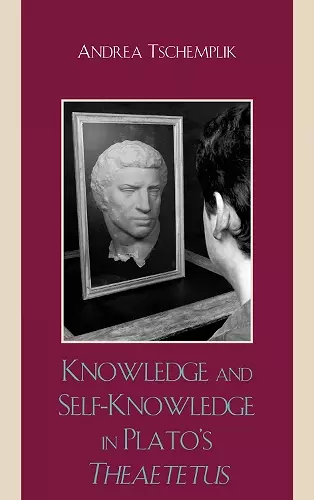Knowledge and Self-Knowledge in Plato's Theaetetus
Format:Hardback
Publisher:Lexington Books
Published:22nd Aug '08
Currently unavailable, and unfortunately no date known when it will be back

Knowledge and Self-Knowledge in Plato's Theaetetus advances a new explanation for the apparent failure of the Theaetetus to come to a satisfactory conclusion about the definition of knowledge. Tschemplik argues that understanding this aporetic dialogue in light of the fact that it was conducted with two noted mathematicians shows that for Plato, mathematics was not the paradigm for philosophy. She points out that, although mathematics is clearly an important part of the philosopher's training, as the educational outline of the Republic makes clear, the point on which the mathematician falls short is the central role that self-knowledge plays in philosophical investigation. Theaetetus betrays this deficiency and is led by Socrates to an understanding of the benefits of self-knowledge understood as the knowledge of ignorance. Tschemplik concludes that it is the absence of self-knowledge in the Theaetetus which leads to its closing impasse regarding knowledge. This book will be of interest to scholars and graduate students in the history of philosophy with a special interest in ancient philosophy, and will also be accessible to upper-level undergraduates in ancient philosophy.
A striking study of crucial themes in Plato's thought. Erudite, insightful, and imaginative. -- Steven M. Cahn
Tschemplik’s monograph emphasizes aspects of the Theaetetus that are often overlooked (e.g., knowledge of ignorance) and aspects of dialogue construction that are not widely understood (e.g., their dramatic and literary frames). She has an answer to the rarely discussed but valid question of why it takes Socrates so long to give a refutation of Theaetetus’ second account of knowledge, when that refutation could have been given in the first place. This is a welcome contribution to the new Platonic scholarship that seeks to understand the dialogues holistically, with equal sensitivity to the arguments and to their literary and dramatic nuances. The volume is important reading for students of the Theaetetus and of Plato generally. -- Gerald A. Press, Hunter College; CUNY Graduate Center
The book's angle is to take a work best known for its analyses of knowledge, observe its aporetic conclusion, and suggest a new reason for that impasse. Tschemplik is very justified in making another go at the problem of self-knowledge in Plato. -- Christopher Moore, University of Texas, Austin * Bryn Mawr Classical Review *
I particularly admire and concur with Tschemplik’s central thesis that even in the Theaetetus the general problem of knowledge cannot be divorced from the Socratic notion that all knowledge is self-knowledge. What makes this reading so forceful in its contribution to the scholarship is that it successfully refutes the oft-claimed notion that in Plato’s later dialogues (such as the Theaetetus) he broke rank with Socrates and developed a theory of knowledge that stands on its own apart from the conversion of the soul that was a key component of Plato’s early dialogues. Her arguments and the evidence she mounts that no such break is evident in the Theaetetus has far ranging implications for a holistic reading of the Platonic dialogues that does not assume a straightforward philosophical division between the early and late dialogues. -- Walter Brogan, Villanova University
ISBN: 9780739125731
Dimensions: 240mm x 162mm x 18mm
Weight: 454g
194 pages